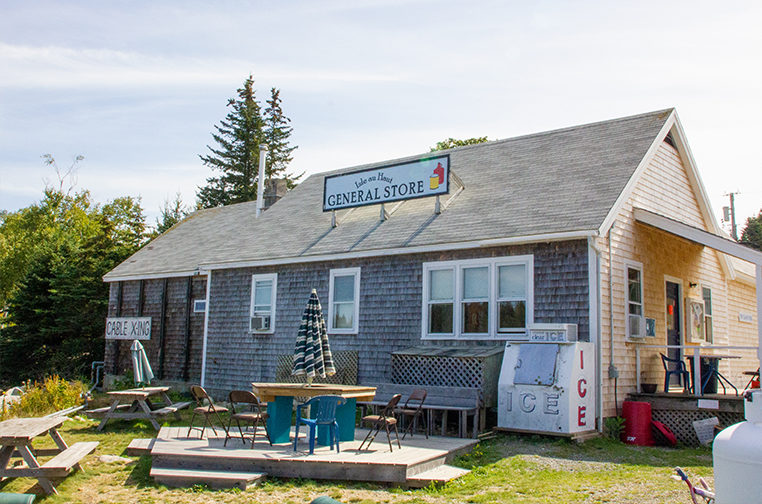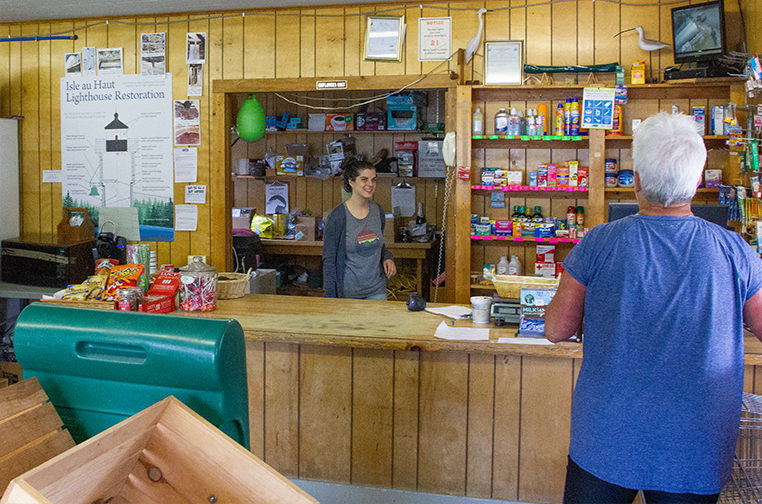BACKGROUND
A cooperative has become a popular model for businesses that serve Maine communities, because it ensures that a small community can maintain some essential services despite its low population density.
Cooperatives, or co-ops, are collectively owned by customers, and overseen by a board of directors who are democratically elected by customers. Profits made by such a business often are reinvested back into the business. People can form co-ops for everything from electricity delivery to lobster buying and selling, but co-ops are often associated in New England with grocery stores and food delivery. While many in Maine are familiar with large co-ops in Blue Hill, Belfast, and Portland, there are many smaller co-ops that serve the needs of more remote communities.
HOW IT WORKS
The Island Store Association is the co-op that maintains the general store which is located a short walk from the town landing on Isle au Haut. The Island Store was once a privately owned business, but the decision was made to switch to a co-op model to help defray the costs and labor of keeping the grocery store’s doors open. Customers pay a small, one-time fee of $10 for membership, and are also encouraged to volunteer as labor for the store’s upkeep.
In the best of times, general stores and grocery stores are labor-intensive businesses that often only yield a small margin of profits on perishable products. Island stores must walk a delicate balance in providing supplemental groceries for customers who often do much of their shopping on the mainland.
During the pandemic, that task became even more difficult for Michael and Bryn Delchamp, the husband-and-wife managers of The Island Store. At first, the pandemic drastically cut into seasonal business for the store, as summer tourism in 2020 was sharply curtailed. Then, in the following fall and winter, the trend reversed, as some islanders began staying on the island and only shopping at the store. We asked Michael Delchamp how the co-op has helped the store thrive, even in difficult times.
Q&A WITH MICHAEL DELCHAMP, MANAGER OF THE ISLAND STORE
What are some of the best parts of being a grocery store manager on the island?
A big part of running the store is it is a labor of love. You have to really want to do it and appreciate its history and how big of a part of the community it is. It’s not not-for-profit, technically, but it’s something you really have to be willing to volunteer a lot of your time for in order to make things work financially.
The 4th of July picnic is partly sponsored by the store, and in the winter, it really is one of the few places people come out to and see other people. The store also hosts a biweekly dinner that we call Tuesday Table. Families will take turns preparing meals, and the Union Congregational Church puts money on a special account at the store so the families can buy the ingredients for the meals they make. Pre-Covid, we met at the Town Hall to get together and share the meal. This winter, we switched to take-out by making soups, bread, and desserts that families could stop by the store and pick up. It’s a good way for the community to check on its neighbors and prepare food for them as well. It also illustrates how the institutions out here work together, in this case the church and store.
How do co-op members help make The Island Store sustainable?
While it may not always seem like we run like a typical cooperative, in many ways I think the little store embodies some of the most important aspects of what it means to truly be “cooperative.”
So many people view the store as part of the community and see the importance of it. There are quite a few people who volunteer their time to help out in the store. There are people who will come and show up on days that we receive deliveries, and they’ll help us bring freight in. It can be quite a chore, because it just gets brought to the town landing. From there, we have to actually put it on a truck and drive the truck to the store from the town landing, and then we have to carry it in ourselves. Another group of about five or six people will come in on Sunday to help us clean.
Volunteers help with special projects, too. Three years ago, we re-shingled the building, and we had people show up and help us do all of that. Two years ago, we repainted the floors, and we had people help us move all of the furniture, all of the equipment, and everything in the store, and then we painted it and then we put it all back. It takes a lot off our plate when people come in and help us do things.
How does the co-op board support The Island Store in general, and how did the board support the store this past year?
The store board is very supportive. I think they view the store as being there for people, and they understand that it is difficult for the store to make much money. They say, “Hey, just do your best to keep things stocked, so that when people need the store, it’s here.” They err on the side of having things the community needs in the store as opposed to being overly cautious.
When the pandemic first hit last spring, the store board authorized a ten percent discount across the board that lasted several months. Many of the board members also donated masks and gloves to help keep Bryn and me safe, and they supported all of the decisions we made, like curbside pickup and delivering groceries.
What other ways has the community supported the store during the COVID-19 pandemic, and vice versa?
The town has always recognized the importance of the store, but throughout 2020, its significance really came into focus. The town realized how much we had lost in the first two quarters after the pandemic, and they gave us a subsidy this year. The church also twice donated money to every year-round resident, and that money was placed in their store accounts to further ensure that residents had access to things they needed and to support the store. These are the reasons why it is such a privilege to run the store and serve the community.
The town has always recognized the importance of the store, but throughout 2020, its significance really came into focus.
Once the pandemic hit, you had a lot more people really using the store as their primary source for groceries. At first, there were few seasonal visitors, but by the time August came, there were a lot of people who were sort of seeking refuge, and they stayed here for a lot longer than usual. The island’s a very social place in the summer, and it wasn’t happening this year. As they were getting ready to leave for the season, they often said how this store was their refuge during the day to come and see people and be able to talk to people. I think it really was very rewarding knowing that we were able to sort of keep people safe, at home, and connected.
Resources:
The interview above has been edited for length and clarity.



